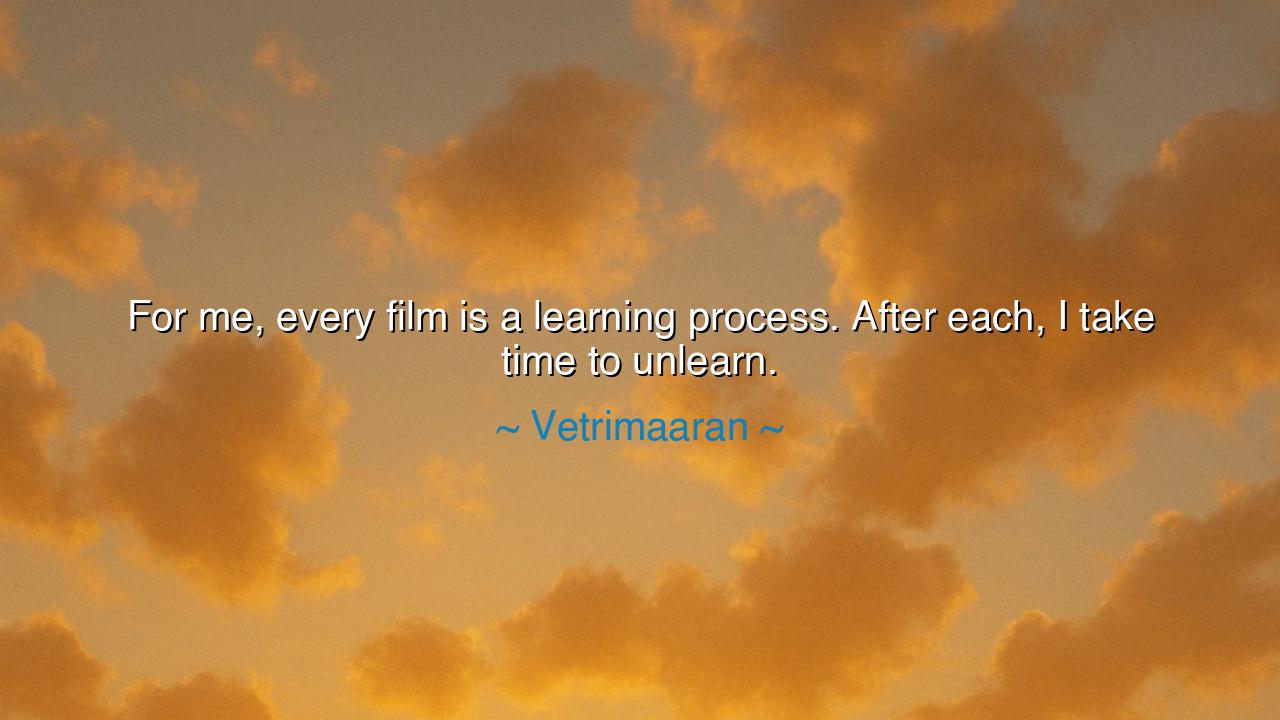
For me, every film is a learning process. After each, I take time






Hear the maker’s vow, simple as a blade and just as sharp: “For me, every film is a learning process. After each, I take time to unlearn.” In this sentence, Vetrimaaran names a paradox at the heart of all enduring craft: we climb by building knowledge, and we climb again by laying part of it down. The apprentice gathers tools; the master chooses which ones to set aside so the hand stays free. To learn without pause is to grow; to unlearn on purpose is to keep from hardening. Thus the artist makes of himself a river—always carrying, never crusting, carving new banks with each passage.
In the old guilds, the journeyman learned a canon—measures, joins, secret ratios. But the cathedral that mattered was the one not yet imagined, and no canon could foresee it. So the wise would empty the cup between commissions, letting habit drain away so that surprise could pour in. This is what it means to call every film a process: preproduction becomes research, production becomes listening, postproduction becomes revision—and then, when the music stops, a final movement begins: unlearning, the deliberate loosening of shortcuts and reflexes that worked yesterday, lest they imprison tomorrow.
Consider the danger of perfection that does not renew. A director solves a narrative problem with a certain shot grammar; it dazzles, earns applause, fixes itself in muscle memory. Next time, the same grammar returns—slicker, emptier. Audiences feel the echo; the work calcifies. Unlearning is the medicine for this drift into repetition. It asks the mind to distrust its easiest excellence, to question the tricks that once saved a scene, to choose risk over autopilot. In that humility, the artist regains beginner’s mind without pretending to be a beginner.
History carries a lantern for this road. Pablo Picasso mastered realism young, then shattered it—period by period, he unlearned what he could already do to discover what he could not yet see. Akira Kurosawa moved from chamber dramas to epic canvases, changing color, rhythm, and scale as if changing dialects; between each work he let constraint, weather, and new collaborators re-teach him cinema. These were not acts of restlessness alone; they were rites of cleansing—rituals that kept the craft alive by letting go of the very habits that had earned its triumphs.
Even outside the arts, innovators have practiced this creed. In martial philosophy, Bruce Lee urged students to “empty your cup,” to discard styles that no longer served the fighter in front of them. In manufacturing, the best teams treat yesterday’s standard as a ladder rung to step beyond—a cycle of kaizen that prizes process over pride. In each case, learning fills the toolbox; unlearning prevents the toolbox from becoming a cage. So the line between mastery and stagnation is drawn not by skill alone, but by the courage to release what once worked.
What, then, is the origin of Vetrimaaran’s claim? It is the rigors of lived filmmaking—stories scouted in real neighborhoods, actors met as collaborators rather than marionettes, rooms where the light disobeys the storyboard, edits where truth arrives only after beloved shots are cut. Such work teaches hard and fast. And when the shoot ends, the director must shed the husk of that particular world: its cadences, its default framings, its research grooves. Only by unlearning the last film can the next film refuse to be its shadow.
Let the lesson be carried like a talisman: hold tight, then let go. Build, then break. Study, then stand ready to be surprised. Practical steps for any maker who would keep evolving: (1) After each project, list your three strongest habits—and deliberately retire one for the next work. (2) Change a constraint—new lens, new format, new rehearsal method—so your eyes wake up. (3) Invite dissent—screen early for people who do not share your taste, and listen for the note beneath their words. (4) Archive and abstain—save your presets and shot lists, then refuse to open them until halfway through the next process. (5) Practice subtraction—cut your cleverest moment if it serves only itself. Do these with steady resolve, and you will make true the oracle: every film becomes a living learning process, and the discipline to unlearn keeps your art from becoming yesterday’s echo, guiding you toward what your work is brave enough to become.






AAdministratorAdministrator
Welcome, honored guests. Please leave a comment, we will respond soon